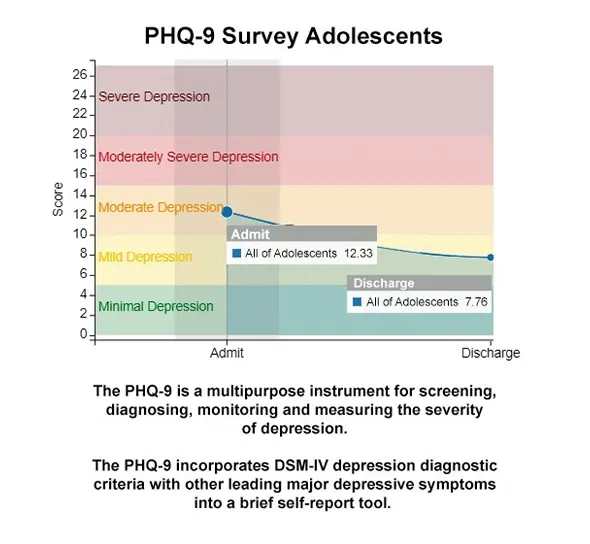Exposure and Response Prevention (ERP) for Teens and Adolescents: What You Need to Know
Exposure and Response Prevention (ERP) is an evidence-based approach to helping those with obsessive-compulsive disorder (OCD) and anxiety gain coping skills for handling uncertainty. During this process, therapeutic exposures will be designed and agreed upon in advance based on the patient’s unique stressors. These exposures will then be performed with your treatment team as part of a long-term care plan.
Confronting known stressors in this way takes trust, courage, and time. At SunCloud, our team builds rapport with patients, creating a therapeutic environment for treating the whole person. By working with the same treatment team and being immersed in a supportive peer group comprised of teens and adolescents, our patients understand that this is a safe place for exploring their emotions. The final piece here is time. We perform ERP therapy exposures with patients a couple times per week at both the partial hospitalization and intensive outpatient level of care based off the client’s specific needs. This gives patients time to learn new ways of approaching situations that were previously daunting.
Any type of mental health care takes work and dedication from both patients and providers. Addressing mental health needs early on will have lasting positive benefits on your child’s future, providing them with the confidence and tools to tackle life’s stressors.
Benefits of ERP Therapy
This approach has been proven to be effective for those suffering from obsessive-compulsive disorder (OCD) and anxiety. Some of the symptoms that these exposures are designed to alleviate long-term are:
- Breaking the habit of avoiding uncomfortable situations. For teens especially, this often manifests in the form of school avoidance.
- Reducing symptoms of stress in these situations including:
- Increased heart rate
- Rapid breathing (hyperventilation)
- Racing thoughts
- Improving feelings of self-efficacy and self-confidence after working through stressful situations.
- Reducing or eliminating the need to turn to safety behaviors.
How Does ERP Work and Who Can It Help
ERP therapy works by teaching the brain new ways of thinking about situations that previously caused distress. By slowly re-introducing these situations, patients will grow more comfortable with them and eventually their stress levels will decrease throughout the course of the exposures. This process will take time, and our trained clinical team will work with your child to ensure that the exposures are thoughtful and appropriate for their needs.
ERP therapy has been proven effective for patients living with OCD. At SunCloud, our team is versed in a variety of modalities so that we can combine ERP with other types of treatment such as talk therapy, medication management, family therapy, and others as appropriate to find the most beneficial approach for each patient.
Steps to Take if You Believe Your Teenager Could Benefit from ERP
If you believe your teen is suffering from obsessive-compulsive disorder (OCD) and anxiety, and would benefit from Exposure and Response Prevention (ERP), working with a primary care physician or family doctor can be an important first step. This can rule out or identify any physical conditions that could be contributing to changes in your child’s mood or behavior. If no underlying physical conditions are discovered, your provider can give you and your teen treatment options to explore together.
Speaking With Your Teen About Receiving Mental Health Treatment
Signs of OCD and anxiety can manifest in different ways. In teens, it can be difficult to separate the normal highs and lows of adolescence from a mental health condition. If your teen seems to be experiencing signs of these conditions, approach them in a safe place in a non-judgmental tone. Explain treatment options to your teen so that they understand what options exist and can be an active participant in the decision-making process.
For a patient to get the maximum benefit from treatment, they must agree to the process and be willing to participate. Being involved in the decision-making process will help teenagers to feel empowered and heard.
Questions to Ask an ERP Treatment Center for Teens
Once you and your teen have agreed that treatment is the right approach, it’s important to vet treatment centers by asking questions like the ones below:
- Will your treatment plan address underlying conditions and prepare my child for real-world scenarios?
- Can my child still attend school while receiving treatment?
- How often do you treat adolescents and teens who have the same condition as my child?
- Is family therapy offered?
Why Work with SunCloud
SunCloud is led by Dr. Kim Dennis, a board-certified psychiatrist who specializes in treating eating disorders, addiction, trauma, and multi-occurring disorders. The SunCloud team takes a holistic and individualized approach, providing your teen with wraparound care and toolbox of resources that they can always turn to.
We understand that any type of exposure work can feel daunting. To ensure that our patients are as comfortable as possible, we build trust and rapport before beginning treatment. We work with patients to explain and agree to the exposures beforehand and conduct a debrief afterwards.
Exposure and Response Prevention (ERP) is the gold standard for treating obsessive-compulsive disorder (OCD) and anxiety. Teaching the brain new approaches to handling existing stressors takes time, but these skills will have lasting positive impacts on your teen’s mental health. By proving to themselves that they can conquer difficult situations with the help of a care team, your teen’s self-confidence will gradually grow.

From admit to discharge, we see an aggregate improvement in our adolescents as measured by the PHQ-9. Lower scores reflect an improvement.

